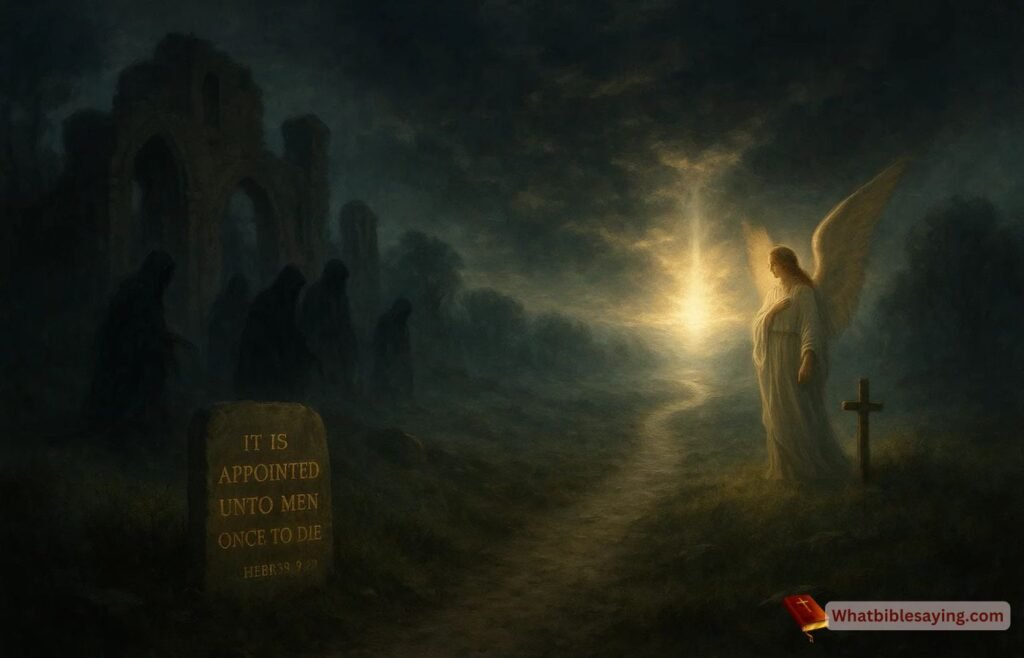 If you’ve ever felt a chill down your spine in a dark room, wondered about that strange sound in the hallway, or watched someone on TV talk to the dead, you’ve probably asked yourself: Are ghosts real? And more importantly, Are ghosts real according to the Bible?
If you’ve ever felt a chill down your spine in a dark room, wondered about that strange sound in the hallway, or watched someone on TV talk to the dead, you’ve probably asked yourself: Are ghosts real? And more importantly, Are ghosts real according to the Bible?
It’s a fair question. Because while pop culture floods us with haunted houses and ghost-hunters, the Bible paints a very different picture one that’s more sobering, but also more comforting.
In this article, we’re going to look honestly at what Scripture says (and doesn’t say) about ghosts, spirits, hauntings, and the afterlife. Whether you’re feeling curious, skeptical, or just a little spooked, I hope this will bring you clarity and peace.
What Does the Bible Mean by “Ghosts”?
Let’s start with something important: when we say “ghosts,” we need to define what we mean.
Most people today think of ghosts as:
The spirits of dead people who haven’t “moved on.”
Souls stuck on Earth, haunting the living.
Entities that can appear, speak, or even scare people.
But the Bible doesn’t really describe anything like this. In Scripture, the word “ghost” is often just an old translation for “spirit” like when Jesus “gave up the ghost” (Luke 23:46, KJV), meaning He died. It doesn’t mean a spooky apparition.
Instead, the Bible speaks clearly about:
The human soul leaving the body at death.
Evil spirits or demons that deceive and torment.
God’s control over the spiritual realm.
So while Hollywood may thrive on ghost stories, the Bible gives us a more serious, focused understanding of the unseen world.
What Does God Say About Ghosts?
When you open your Bible, you won’t find a verse that says, “Ghosts are real,” or “Ghosts don’t exist.” But you will find strong clues about what happens after death and how God views spiritual contact.
Here’s what we learn:
1. The Dead Do Not Linger
“People are destined to die once, and after that to face judgment.”
Hebrews 9:27 (NIV)
This is huge. The Bible teaches that when someone dies, their soul doesn’t hang around haunting houses or visiting the living. Instead, they face God’s judgment either going to be with Him or separated from Him.
There’s no mention of humans roaming the earth in ghost form.
2. God Forbids Speaking to the Dead
“Let no one be found among you… who practices divination or sorcery… or who consults the dead.”
Deuteronomy 18:10–12 (NIV)
Trying to communicate with spirits or the dead what we’d call necromancy was a serious offense in the Old Testament. God didn’t just frown upon it; He detested it.
This tells us something important: even if people think they’re talking to a ghost, they may actually be interacting with something much darker.
Do Evil Spirits Exist in the Bible?
Yes. And this is where the conversation shifts from “Are ghosts real?” to “What kind of spirits are real?”
Scripture makes it clear that evil spirits also called unclean spirits or demons exist and operate in the world.
Examples from Scripture:
Jesus cast out demons from many people, including the man possessed by a “Legion” of spirits (Mark 5:1–20).
Evil spirits could cause sickness, madness, or violent behavior (Luke 9:37–43).
These spirits were terrified of Jesus, recognizing His authority.
So while the Bible doesn’t teach that the spirits of dead humans wander the earth, it absolutely affirms the reality of non-human spirits some good (angels), and some evil (demons).
What’s the takeaway?
Many so-called “ghost” encounters could be demonic in nature not harmless or friendly, but deceptive and dangerous.
What About the Witch of Endor? (1 Samuel 28)
If you’ve read this far, you might be thinking, “But wait didn’t Saul talk to a ghost in the Bible?”
Yes, the story in 1 Samuel 28 is often brought up in this conversation.
The Story in Brief:
King Saul, desperate and afraid, seeks out a medium a woman who communicates with the dead even though he knows God forbids it. He asks her to summon the prophet Samuel, who had already died.
And then… Samuel appears. Or at least something that looked like him.
But here’s the thing: the Bible never calls it a ghost.
And scholars debate whether this was:
Really Samuel (allowed by God for a specific reason),
A demonic spirit impersonating him,
Or just a vision conjured through the woman’s dark arts.
The event was rare, forbidden, and condemned. It’s not a green light for ghost-chasing it’s a red flag warning.
What Does the New Testament Say?
There’s a fascinating moment after Jesus rose from the dead. When He appeared to His disciples, they were terrified.
“They were startled and frightened, thinking they saw a ghost.”
Luke 24:37 (NIV)
Here, we see that people in the first century believed in ghosts or at least some version of spirits appearing after death.
But what does Jesus do?
He reassures them:
“Look at my hands and my feet. It is I myself! Touch me and see; a ghost does not have flesh and bones.”
Luke 24:39
He’s not confirming that ghosts are real. He’s saying, “I’m not one of them.” He proves His physical resurrection, not a ghostly presence.
So… Is There Any Proof That Ghosts Exist?
From a biblical standpoint, no.
There is no proof that the spirits of dead humans appear and interact with the living.
However, people around the world both Christian and not report paranormal experiences, haunted places, and ghost sightings.
So how do we explain this?
Three Possible Explanations:
Natural Causes
Sleep paralysis, stress, grief, or hallucinations can make people feel like they saw something.
Deception by Evil Spirits
Demons can mimic the dead to confuse and mislead.
Paul warned in 2 Corinthians 11:14, “Satan himself masquerades as an angel of light.”
Psychological Influence
Cultural expectations and fear can shape experiences. If you expect ghosts, your mind may “fill in the blanks.”
Bottom line? The Bible doesn’t give room for ghosts of the dead wandering among us but it warns us clearly about deception and spiritual warfare.
What Does God Say About “Ghosting”?
This might sound off-topic, but since it’s one of our LSI keywords, let’s touch on it briefly.
“Ghosting” today usually means cutting someone off without explanation vanishing from their life, especially in relationships.
While the Bible doesn’t use the term “ghosting,” it speaks volumes about how we should treat others:
“Do to others as you would have them do to you.” Luke 6:31
“Love is patient, love is kind… it is not rude, it is not self-seeking.” 1 Corinthians 13:4–5
In other words, respect, honesty, and kindness are the standard. If we’re in a situation where we need to step away from someone, it should be done with grace not silence.
Should Christians Be Afraid of Ghosts?
Fear sells. That’s why every October, Hollywood lines up new horror movies and haunted house attractions. But Scripture gives a radically different response to fear.
“God has not given us a spirit of fear, but of power, love, and a sound mind.”
2 Timothy 1:7
You don’t have to fear ghosts. You don’t have to live in anxiety over hauntings or spiritual threats. If you belong to Christ, you are protected.
“The One who is in you is greater than the one who is in the world.”
1 John 4:4
Instead of fear, we’re invited to walk in trust. Instead of superstition, we hold to truth.
Are Ghosts Real According to the Bible?
If you’re still wondering, “Are ghosts real according to the Bible?” here’s a summary:
No, the Bible does not teach that the souls of the dead linger as ghosts.
Yes, the Bible warns of evil spirits that can deceive, harm, or pretend to be the dead.
Yes, God forbids contacting the dead or playing with the spiritual realm outside of Him.
No, Christians don’t need to live in fear we are secure in Christ.
What the world calls a “ghost” may just be fear, imagination, or something darker pretending to be light. But you don’t have to figure it all out on your own. God’s Word gives us everything we need to walk wisely, with peace not panic.













